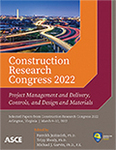Construction Procedural Information Extraction from Textual Sources to Support Scheduling
Publication: Construction Research Congress 2022
ABSTRACT
Nowadays, construction schedule generation still mostly relies on manual efforts to arrange activity information and fulfill the scheduling tasks. There is a lack of automation and efficiency. The heavy reliance on manual efforts may also introduce human errors in the process. Although there are many construction scheduling software platforms, such as Synchro, Primavera 6, and Powerproject, they require manual input of activity information based on procedural documents or experience. To bridge the gap of automation in generating scheduling information, in this paper, the authors proposed a semantic natural language processing (NLP)-based information extraction (IE) method to automatically extract, process, and analyze procedural information from procedural documents to support construction scheduling applications. This method automatically generates a report of all activities in a right sequence considering each activity’s predecessors and successors, which can reduce manual efforts in arranging activity information for scheduling tasks. An experiment was conducted on a set of open-source specifications to demonstrate the performance of procedural information processing when using the proposed IE method. Comparing to a manually developed gold standard, 95.83% precision and 90.45% recall were achieved using the proposed IE method for the extraction of construction procedural information. In addition, running the IE algorithm to generate activity information led to 89.33% time saving when compared to manual activity information generation. The high performance achieved in accuracy and efficiency using the proposed method showed it is promising in bringing the traditional manual construction scheduling process one step closer to full automation.
Get full access to this article
View all available purchase options and get full access to this chapter.
REFERENCES
Akanbi, T., and Zhang, J. (2021). “Design information extraction from construction specifications to support cost estimation.” Automation in Construction, 131(November 2021), 103835.
Anglin, J. M., Miller, G. A., and Wakefield, P. C. (1993). “Vocabulary development: A morphological analysis.” Monographs of the society for research in child development, i-186-i-186.
Artstein, R. (2017). “Inter-annotator agreement.” In Handbook of linguistic annotation. Springer, Dordrecht, Berlin, Germany, 297–313.
Caldas, C. H., Soibelman, L., and Han, J. (2002). “Automated classification of construction project documents.” Journal of Computing in Civil Engineering, 16(4), 234–243. DOI: https://doi.org/10.1061/(ASCE)0887-3801(2002)16:4(234).
Clough, R. H., Sears, G. A., Sears, S. K., Segner, R. O., and Rounds, J. L. (2015). Construction contracting: A practical guide to company management. John Wiley & Sons, New York, NY, USA.
CSI (Construction Specifications Institute). (2017). Construction Specifications Institute. <https://www.csiresources.org/institute/csi-history> (April 20, 2021).
Falotico, R., and Quatto, P. (2015). “Fleiss’ kappa statistic without paradoxes.” Quality & Quantity, 49(2), 463–470. DOI: https://doi.org/10.1007/s11135-014-0003-1.
Fautsch, C., and Savoy, J. (2009). “Algorithmic stemmers or morphological analysis? An evaluation.” Journal of the American Society for Information Science and Technology, 60(8), 1616–1624. DOI: https://doi.org/10.1002/asi.21093.
Gong, J., Liu, C., and Huang, X. (2020). “Advances in urban information extraction from high-resolution remote sensing imagery.” Science China Earth Sciences, 63(4), 463–475.
Goutte, C., and Gaussier, E. (2005). “A probabilistic interpretation of precision, recall and F-score, with implication for evaluation.” In European conference on information retrieval, 345–359. Springer, Berlin, Heidelberg. DOI: https://doi.org/10.1007/978-3-540-31865-1_25.
Grishman, R., and Sundheim, B. M. (1996). “Message understanding conference-6: A brief history.” In COLING 1996 Volume 1: The 16th International Conference on Computational Linguistics, 1(1996), 466–467.
Landis, J. R., and Koch, G. G. (1977). “The measurement of observer agreement for categorical data.” biometrics, 33(1), 159–174. DOI: https://doi.org/10.2307/2529310.
Manica, M., Auer, C., Weber, V., Zipoli, F., Dolfi, M., Staar, P., Laino, T., Bekas, C., Fujita, A., Toda, H., Hirose, S., and Orii, Y. (2019). “An information extraction and knowledge graph platform for accelerating biochemical discoveries.” Workshop on Applied Data Science for Healthcare at KDD, arXiv preprint arXiv:1907.08400, Anchorage, AK, USA, 1–3.
Niklaus, C., Cetto, M., Freitas, A., and Handschuh, S. (2018). “A survey on open information extraction.” 27th International Conference on Computational Linguistics, arXiv preprint arXiv:1806.05599, Springer LNCS.
Sarawagi, S. (2008). Information extraction. Now Publishers Inc, Boston, MA, USA.
Singh, S. (2018). “Natural language processing for information extraction.”.
Suprayogi, E., Budi, I., and Mahendra, R. (2018). “Information Extraction for Mobile Application User Review.” In 2018 International Conference on Advanced Computer Science and Information Systems (ICACSIS), IEEE, 343–348. DOI: https://doi.org/10.1109/ICACSIS.2018.8618164.
Webster, J. J., and Kit, C. (1992). “Tokenization as the initial phase in NLP.” In COLING 1992 Volume 4: The 15th International Conference on Computational Linguistics, Springer LNCS, 1106–1110.
Zhang, J., and El-Gohary, N. M. (2016). “Semantic NLP-based information extraction from construction regulatory documents for automated compliance checking.” Journal of Computing in Civil Engineering, 30(2), 04015014. DOI: https://doi.org/10.1061/(ASCE)CP.1943-5487.0000346.
Zhong, B., Xing, X., Luo, H., Zhou, Q., Li, H., Rose, T., and Fang, W. (2020). “Deep learning-based extraction of construction procedural constraints from construction regulations.” Advanced Engineering Informatics, 43(2020), 101003. https://doi.org/10.1016/j.aei.2019.101003.
Zhou, J., Love, P. E., Wang, X., Teo, K. L., and Irani, Z. (2013). “A review of methods and algorithms for optimizing construction scheduling.” Journal of the Operational Research Society, 64(8), 1091–1105. DOI:https://doi.org/10.1057/jors.2012.174.
Information & Authors
Information
Published In
History
Published online: Mar 7, 2022
Authors
Metrics & Citations
Metrics
Citations
Download citation
If you have the appropriate software installed, you can download article citation data to the citation manager of your choice. Simply select your manager software from the list below and click Download.
